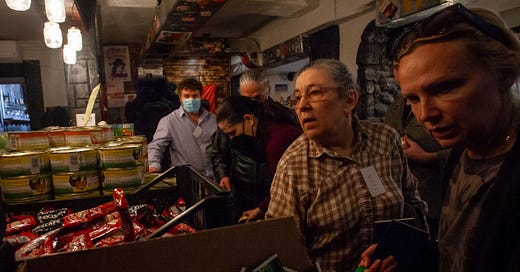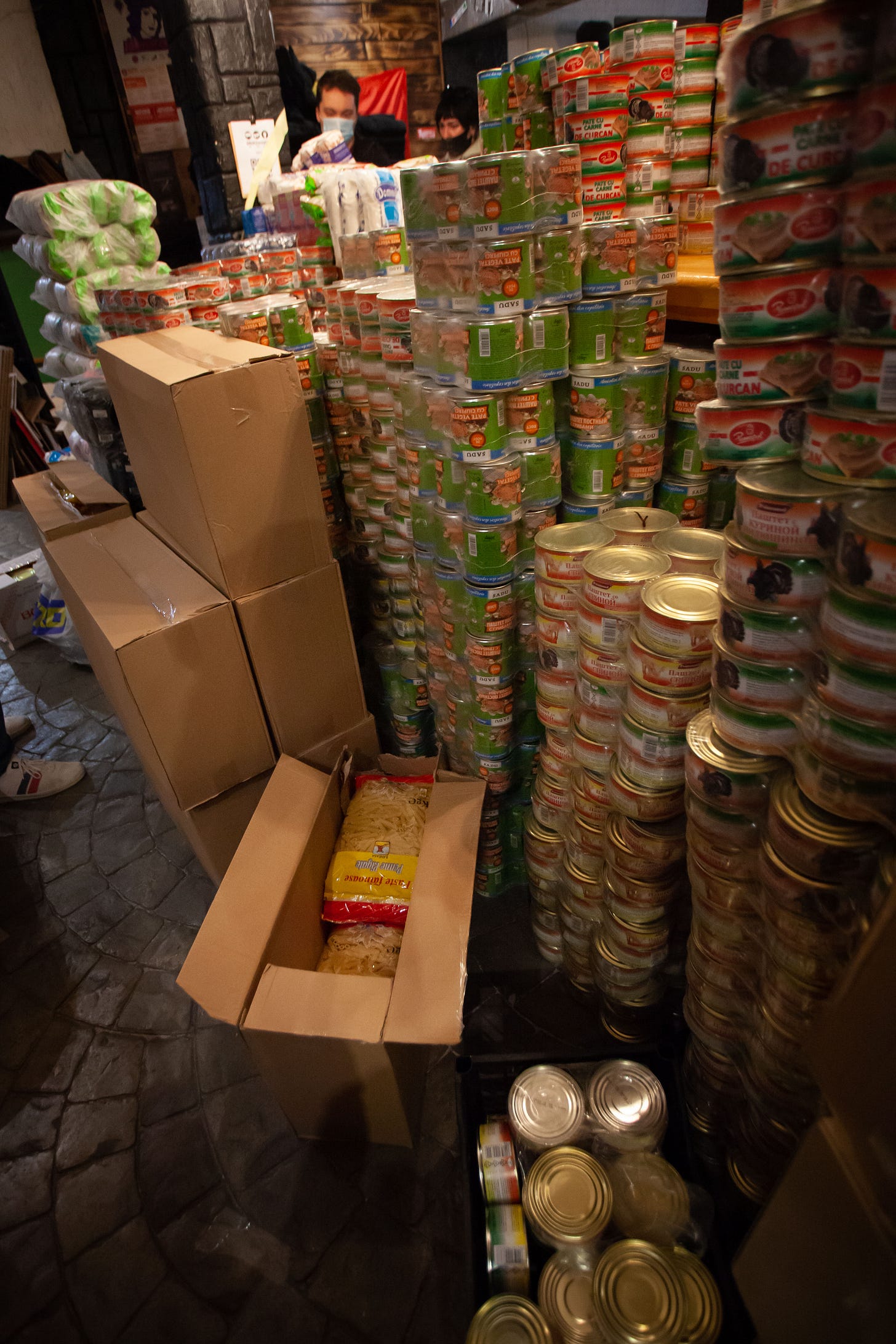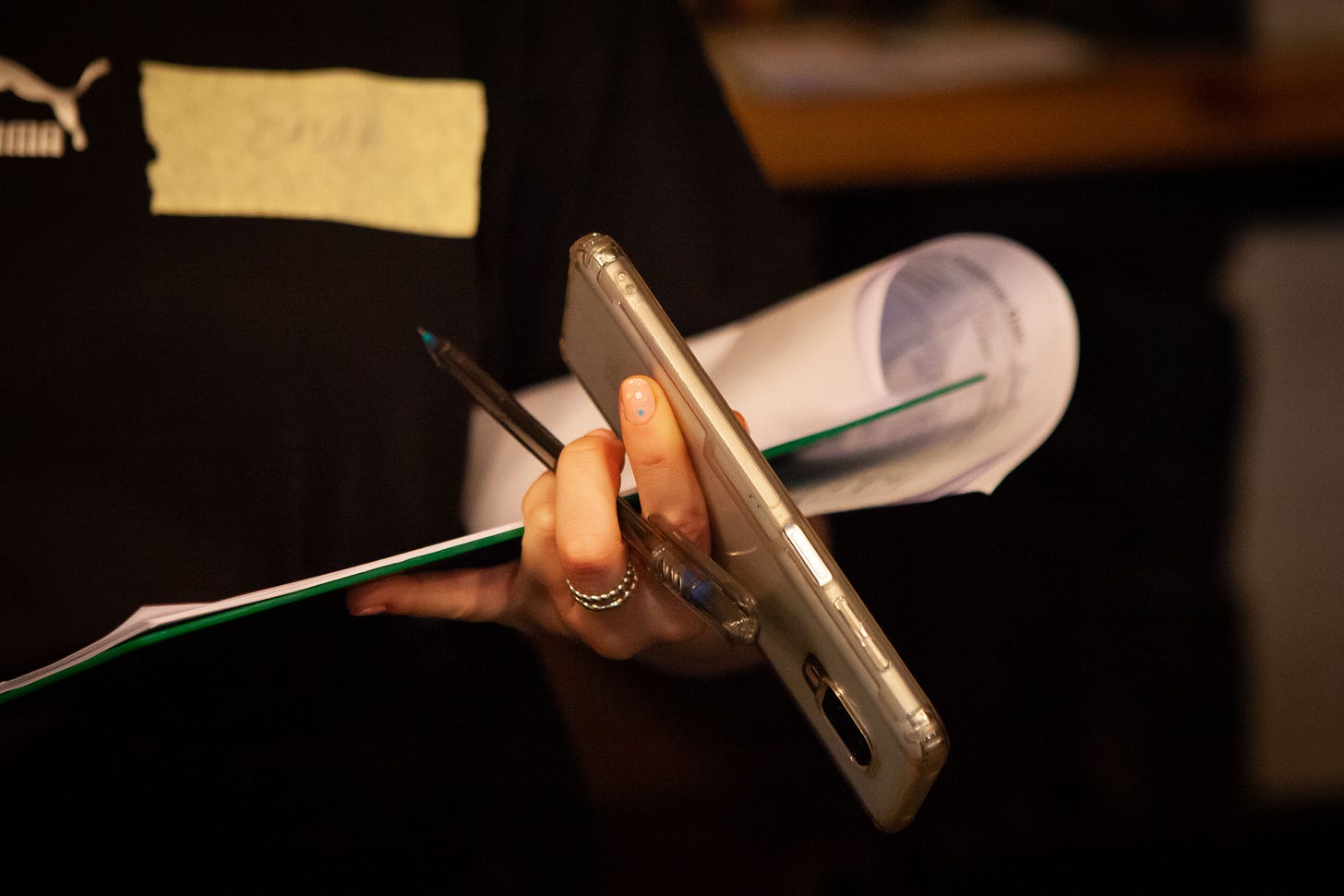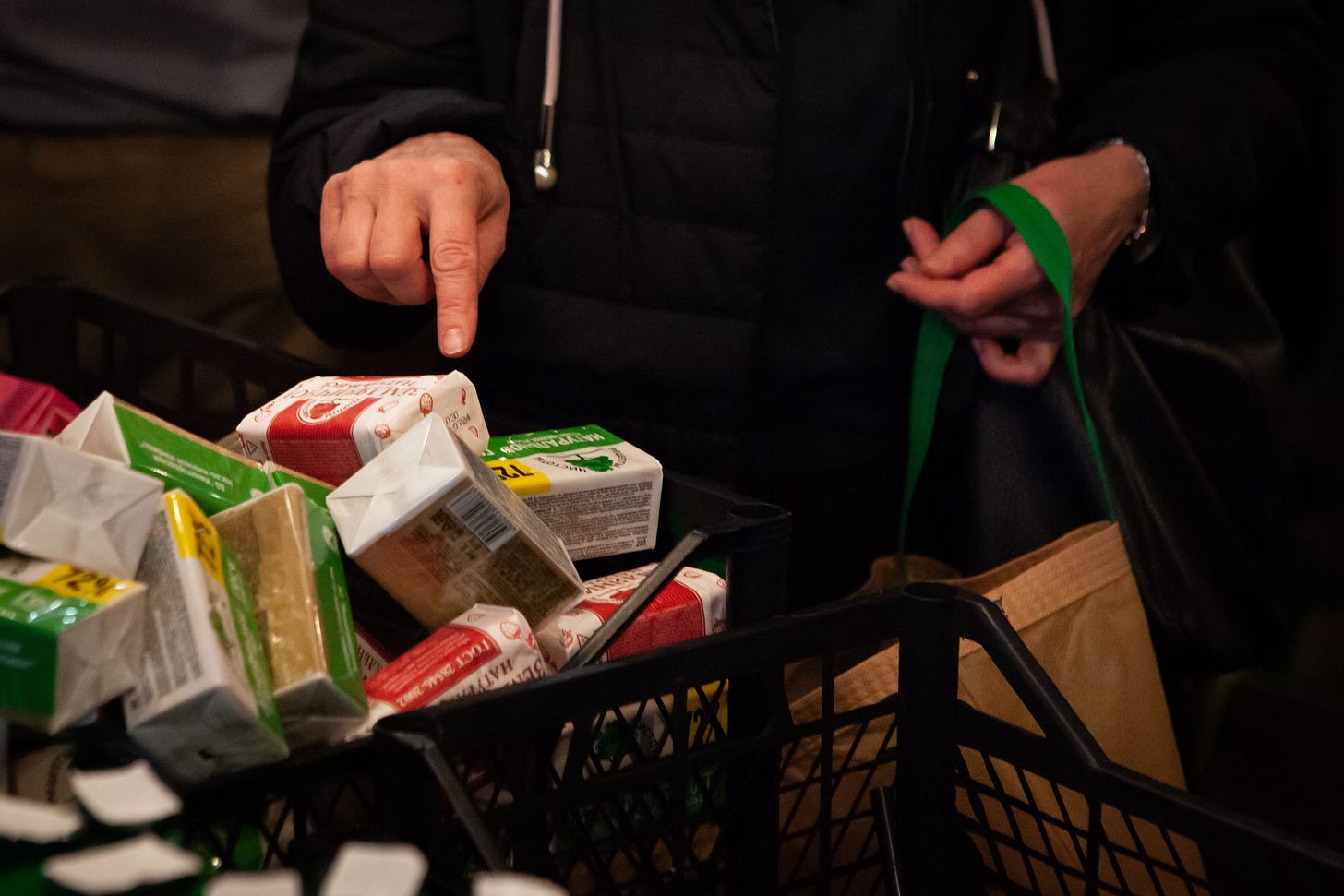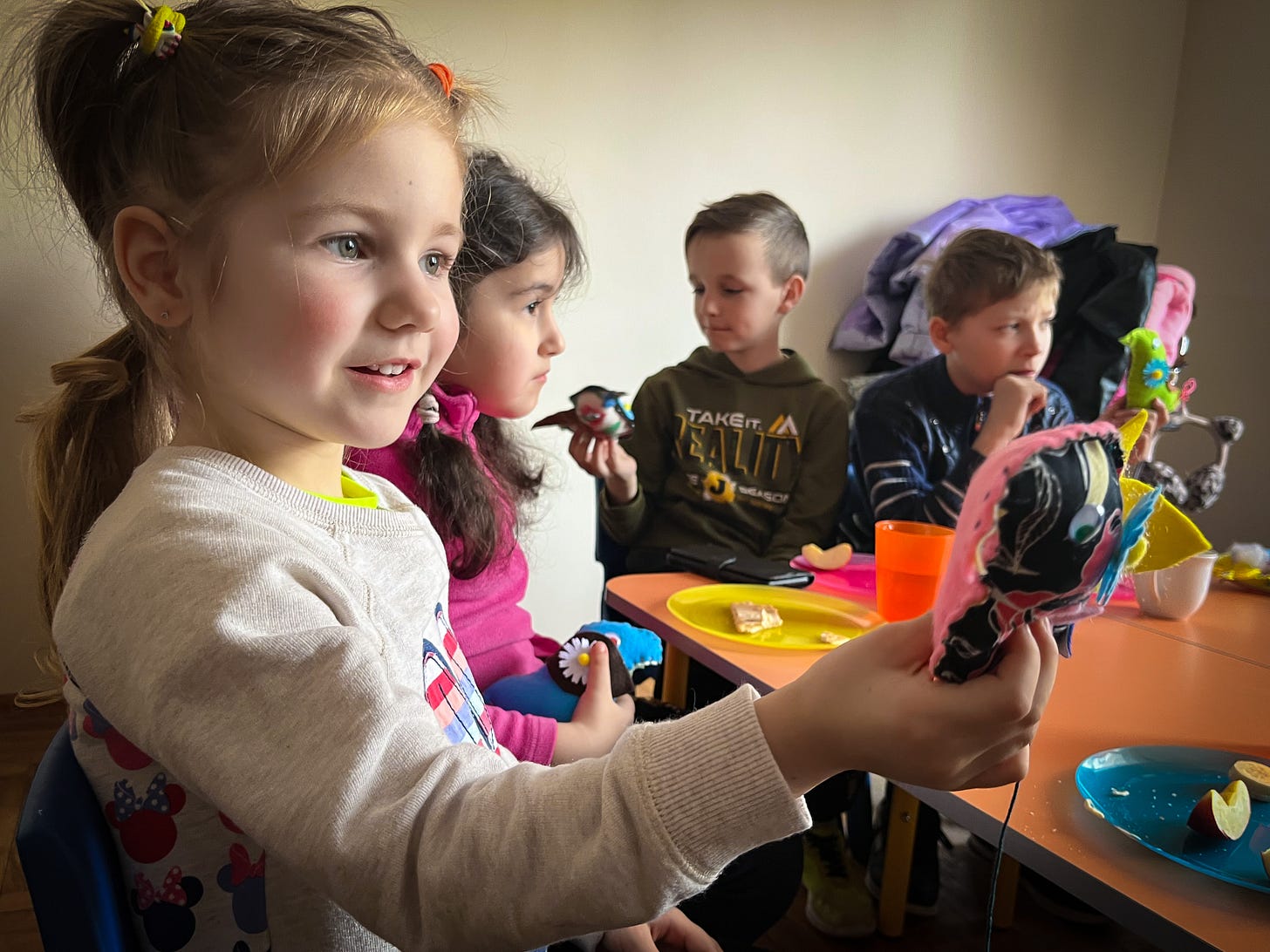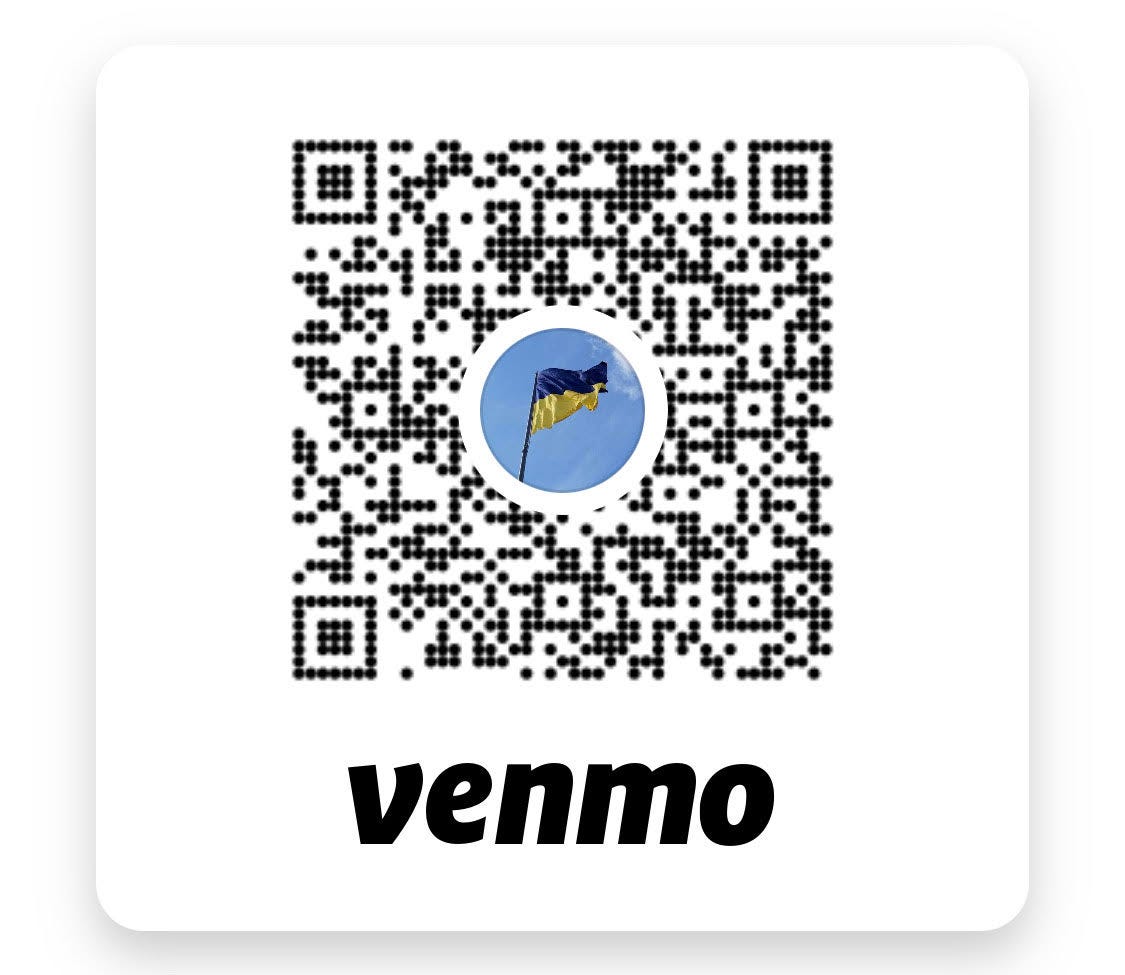Case study in caring: Smokehouse
Writing, photography, and videography by: Clary Estes. Edited by: Wilmer Rojas
COVID before the war
I walked down into Smokehouse for the first time in five years. The subterranean restaurant felt familiar, yet different from the one I knew during my stint as a Peace Corps volunteer. Instead of booths full of people drinking regional craft beer and eating the best BBQ in Moldova, the walls were piled high with diapers, toiletries, boxes of pasta, clothes, and everything in between.
“Welcome to the insanity!” Vlad and David both told me in different measures at different times. And indeed, Smokehouse had been at the center point of refugee relief in the Republic of Moldova for over a month as I walked through its doors in late March. It was quiet at 6 pm that Thursday, but an hour earlier the line of refugees waiting to get in extended down the block. It was a line that grew every day with no indication of stopping.
In the last five years, a lot has changed in Moldova. The once pockmarked streets of downtown Chișinău, Moldova’s capital, are now a bit more polished and spacious, but the COVID pandemic had an undeniable effect on the city’s businesses. Due to the pandemic, Smokehouse shuttered its doors in January 2022 and transitioned to the smaller bar they opened next door, Taphouse 27.
Yet, they found themselves opening again just a month later, not to serve beer, but as a refugee distribution center. Only a couple of days after the Russian invasion of Ukraine, Smokehouse, the beer and BBQ joint, began to take on a variety of names, ranging from the Smokehouse Distribution Center to the AIM/PC Hub (AIM standing for Alianța Întreprinderilor Mici și Mijlocii din Moldova, or the Alliance for Moldova Small Business, and PC standing for Peace Corps), to “whatever the fuck you wanna call it,” as Vlad liked to put it. The names attached to the distribution center changed as rapidly as the needs they were addressing.
Legacy of Peace
Co-owners Vlad and David met in 2014 and quickly banded together to start Smokehouse. Despite having to navigate endless bureaucratic hoops, instances of government corruption, and David almost being forced to leave the country, by June of 2015 they opened their doors and quickly became a popular ex-pat hang-out spot. Peace Corps volunteers called this bar home while they were visiting Chișinău for their brief respites from village life. At the time, it was one of the only places you could get a decent pale ale in the entire country.
David, for his part, stayed locked into both the Peace Corps and international diplomacy networks as he built his life in Moldova, which has made him one of the more notable RPCVs. The “R” of the acronym stands for “Returned”: the idea is that you never stop being a Peace Corps volunteer, you merely return home. If the Russian invasion has proven anything, it is that for many Peace Corps volunteers this is true. Many of the regular volunteers leading refugees through the aisles, helping unload supplies, and documenting who was coming in and out were in fact RPCVs from Moldova or surrounding countries.
So it was natural for Smokehouse, Peace Corps Moldova, AIM, Open Gate International (a nonprofit that focuses on issues of homelessness), and Friends of Moldova (a nonprofit organization run by Return Peace Corps Volunteers), among others, to partner together to address the refugee crisis. Soon, a wave of grassroots support came in and the team got to work.
A grassroots answer to war
“Startup truly consisted of secondhand donations and individuals doing grocery store runs for less than $300,” said Meredith, an American volunteer. “Week by week, grocery-store runs per day went from $300 a day up to $10,000 per day. This was in addition to unexpected walk-in donations and secondhand donations.”
Meredith came to Moldova with her husband, who works for the embassy. She got involved with Smokehouse as a result of a friendship she made with one of Peace Corps Moldova’s American staff. In response to the needs she saw, she sent out a call to her social media account for donations. The response was astonishing.
“My personal fundraising efforts started with an Instagram post on Saturday, February 26th to my private account. I told friends and family that I was going to volunteer at a donation center. If they wanted to Venmo me money, I would use 100% of their donations to purchase groceries. I posted it before I went to sleep and by the end of Sunday the 27th I had raised $6,320. I was blown away.”
On that first day, Meredith got 71 individual financial donations. So she decided to fundraise on a daily basis to support the Smokehouse initiative. In total she was able to raise about $120k; the majority went to Smokehouse and the rest to other refugee initiatives. It was only a matter of time before Meredith got more and more involved, and soon Meredith headed up many of Smokehouses day to day needs.
Yet, Meredith’s story is not unique. When the war broke out Bartosz, another RPCV, wanted to figure out how to help. “I messaged David and asked, ‘What can I do? I want to help.’ David then responded, ‘Well, you are the president of Friends of Moldova, right? And it’s a 501(c)(3), so you can fundraise right?’ When I said yes he simply responded, ‘Well, do you want to do this? Does Friends of Moldova want to help us?’ After a brief pause, I said, ‘Yeah! Fuck it! Let’s do this!’”
Friends of Moldova then went from being a humble small grants program to being an organization handling many more responsibilities.
“My first reaction was, ‘What have I signed up for?’ We started a fundraiser that weekend and it exploded. That first week, we started sending tons of money to Smokehouse. We had no idea what was going to happen. We were sending $20,000 worth of transfers. Prior to that, we were the kind of organization that had an annual budget of only $5,000. It was a bit scary. And it just kept growing and growing. In the end, we have raised around $400,000. $165,000 of that went to Smokehouse and the rest has been going to other refugee relief organizations.”
The supplies that Smokehouse was procuring were not exclusively being given out in-house; they were also being shared and distributed to other centers.
“Hospitals, housing centers, and a ton of local places would call us and say, for example, ‘We have beds, but there's no food.’ So Vlad and I went to the grocery store together, filled up my SUV with tons of food, and dropped it off where it needed to go,” Meredith recalled. And these donation runs extended to bedding, diapers, strollers, everything.
“Everyone was so grateful. We just made sure that we stayed in touch with everyone who was doing work and made sure that supplies got where they needed to go,” she said.
The Smokehouse model started growing. Before they knew it they were setting up distribution centers in other parts of the country. The model worked and it was spreading.
The volunteer team at Smokehouse listened to the needs of the community and responded as fast as possible. Across the country, Smokehouse, along with many other Moldovan organizations knew that there was no time to delay, so they did what they could, with what little they had. But a month and a half into the crisis and the energies, resources, and patience of the volunteers at Smokehouse and across Moldova were starting to wane.
“Assessing the situation”
As David wrote in his March 24th Substack post (consider subscribing, it is a great page), “Every day I am getting nervous calls from the churches and NGOs [we are helping] asking, ‘Where is the Cavalry?’
“[Our] whole effort was meant to be a stop-gap. A holding tactic to help Moldova’s government and authorities manage a crisis while the UN, USAID, World Food Program, and other groups with tents, blankets, mattresses, and lots of volunteers wearing vests with logos on them show up.
“One month into the war, they are not here.”
Vlad reflects on the refugee aid they are doing in Moldova a month after the Russians invaded Ukraine in late February 2022. Though the relief center is now closed, a month and a half into their work, they were still wondering when help from international aid organizations was going to come.
Instead, David and many other volunteers were stuck in an endless parade of meetings with various organizations that were coming in and “assessing the situation,” a term that by now has been tinged with more than a little frustration. People across the country were at their breaking point, yet they kept working.
“Grassroots organizations like ours — we were the real first responders,” said Bartosz. “The large organizations were honestly absent. I got here on March 20th and I did not see these organizations running anything – that is almost a month into the war and they still weren’t here. Comparatively, I saw lines of refugees outside of Smokehouse waiting for supplies. I even saw group chats of volunteers who were focusing on transporting refugees to and from the border.”
Another volunteer said, “You know, in the past when there was a major crisis, I didn’t think twice. I would always give money to the big organizations to help, but what I have seen here has really made me think twice about doing that in the future.”
“Now, there’s slowly been a handoff, but not a perfect one,” said Bartosz. Indeed, Moldova is now seeing more and more of an international aid presence, but they have not been quick on the uptake. Some of this comes from the fact that these organizations do not have a history of working in the country, or chose to leave years earlier.
At Smokehouse, one of the earliest cash assistance programs was introduced by just such an organization, and the mistakes made were… surprising. “They didn’t have anywhere to set up this program,” Vlad explained to me. “So they ran it through Smokehouse.”
The first day of the program hosted a variety of problems: a lack of fliers or fliers with unscannable QR codes (making them useless), only two people registering people, and only one tablet that ended up working. Refugees found themselves turned away in those first days. Frustration, understandably, mounted.
Furthermore, projects like this have been overly complicated. For example, a refugee can register for a phone call to get cash assistance but cannot register for the assistance itself. These calls alone have taken weeks for refugees to receive. After they are registered, they will have to wait potentially weeks again to get assistance. “What are people supposed to do in the meantime?” volunteers kept asking me.
Another issue highlights the uniqueness of the Ukrainian refugee crisis: Moldova needs cash assistance for Moldovan families hosting Ukrainians. Yet, to date, I have heard of only one program that gives out a one-time 150 euros payout. This will hopefully change soon.
Luckily, things are improving and larger organizations are getting their footing. And despite early frustrations, volunteers across Moldova are still stepping up to make these programs work. Day by day international and local NGOs along with Moldovan governmental organizations are connecting more and more (a process David has jumped feet first into helping with as well). So while it is still slow coming, there is hope for future work.
Moldova is a case study in caring
As frustrating as the international response has been in the early days, we see a couple of major takeaways from the Ukrainian refugee crisis. First, international aid was hit, somewhat understandably, totally unawares. Europe has not seen a refugee crisis like this within its borders since WWII. The way that international humanitarian aid organizations typically operate just doesn’t work here. That being said, we also see a good opportunity for analyzing how these organizations work in other countries and asking whether or not they live up to the standard of humanity that liberal democracies expect for themselves.
Moldovan, Ukrainians, and even Russians are deeply connected through history, language, and culture. If you look at a map, Moldova looks like it is midway through being eaten by Ukraine. Moldova shares a border on three sides with Ukraine. There are cities and towns in the north of Moldova that have a high ethnically Ukrainian population and where you can hear Ukrainian being spoken regularly. Similarly, there are parts of Ukraine with a high number of ethnically Moldovan people and where Romanian is commonly spoken as well. And both countries speak Russian in addition to their native language. Both countries also send their kids to school in Moscow, or their husbands to work in Russia. If Ukraine falls, Moldova is next.
“Normal” methods of refugee aid are not going to work here as they work elsewhere, including in any other part of Europe. The tent cities now sit empty, but when they were being used, no one stayed there longer than 8-12 hours. The Ukrainians that decided to stay in Moldova are staying with generous strangers and also friends and family. The nature of the aid has had to change to accommodate that; it has not been an easy shift. This brings me to our second takeaway.
Moldova stepped up. The poorest country in Europe took in the highest per capita influx of refugees and took care of them with scant support from major aid organizations. Grassroots efforts supported refugees, a beautiful reality that speaks to the overwhelming goodness in humanity in the face of violence. I can only hope such goodness will spread to other areas of the world in the midst of strife. This reality also provides international aid organizations with qualified, informed, and caring volunteers and non-profit professionals who are familiar with the situation and who can help them tailor their work in the country, should they use them.
After over a month and a half of work, Smokehouse reached the end of its rope and shuttered again its doors on April 8th, this time for the last time; or “until the next shit show,” as I heard David joke once.
Over the course of six weeks, it served 38,198 Ukrainians, including 7,847 individual or family walk-ins. It also helped 175 community centers, nonprofit organizations, and shelters. Thirty-four Peace Corps Moldova staff and over ninety-four volunteers helped during that time. During its last day alone it served 1,863 people. The need was still there, but it was time for someone with more capacity to take over. They had to draw the line somewhere.
During its last days, Smokehouse worked to help international humanitarian aid organizations develop their cash voucher system. In the final three days of their operation, they processed about 5 million lei in cash assistance to around 665 families, including an additional 480 pharmacy vouchers approximately. Their biggest day was their last day, as families lined up around the block for help. Some families stood in line for around six hours, including a pregnant woman. This system is being adopted by the bigger organizations, but is still finding its feet. Refugees still trickle into the Taproom 27 bar every once in a while asking questions.
Moving forward
As Orthodox Easter approaches and the attacks on Ukraine continue, Moldova is considering a dual moment of celebration and sorrow amongst the fatigue of a month that never seems to end. People are moving forward nonetheless. The help will continue to come from within the country as forces outside catch up, and more stories will surface about the help being given and the community being made during these difficult times.
As far as the volunteers at Smokehouse are concerned, the work isn’t over, it has just moved outside of the Smokehouse walls.
“I couldn’t give it up cold turkey.” Meredith joked, “I guess I could have gone back to my daily life where things were easy, but that just didn’t seem like an option to me with everything that was going on and everything that still needed to be done.”
Since her time at Smokehouse, she has worked with local Moldovan NGOs to develop The Sunflower Center, whose aim is to help “Ukrainian refugee mothers plant a seed for their children in Moldova.” Their work currently involves trauma-based counseling, early childhood development programs, and running their own donation center, with plans to grow. The center has already employed 3 Ukrainian teachers, 2 Moldovan teachers, 1 Ukrainian cook with her daughter assisting, as well as 1 Moldovan receptionist. As of April 19th, the center has already hosted its first two pilot early education art classes.
Bartosz’s work has hardly slowed down since the closing of Smokehouse either. Rather, he and David are working tirelessly to make sure that the refugee donation centers set up across the country are able to function effectively and have access to everything that they need. They are both also working to connect a number of international and local NGOs with governmental organizations to make sure that assistance is streamlined and effective as the conflict continues. Friends of Moldova continues to grow and take donations for their efforts.
For our part, we will offer more “Case studies in care” in partnership with a variety of people and organizations who have been working tirelessly to help in any way that they can. As we develop this series we will explore not only what has been and is being done, but also share ways that you can help. To help us, as well as those we are working with, please consider a paid subscription or a one-time donation via Venmo or PayPal.
